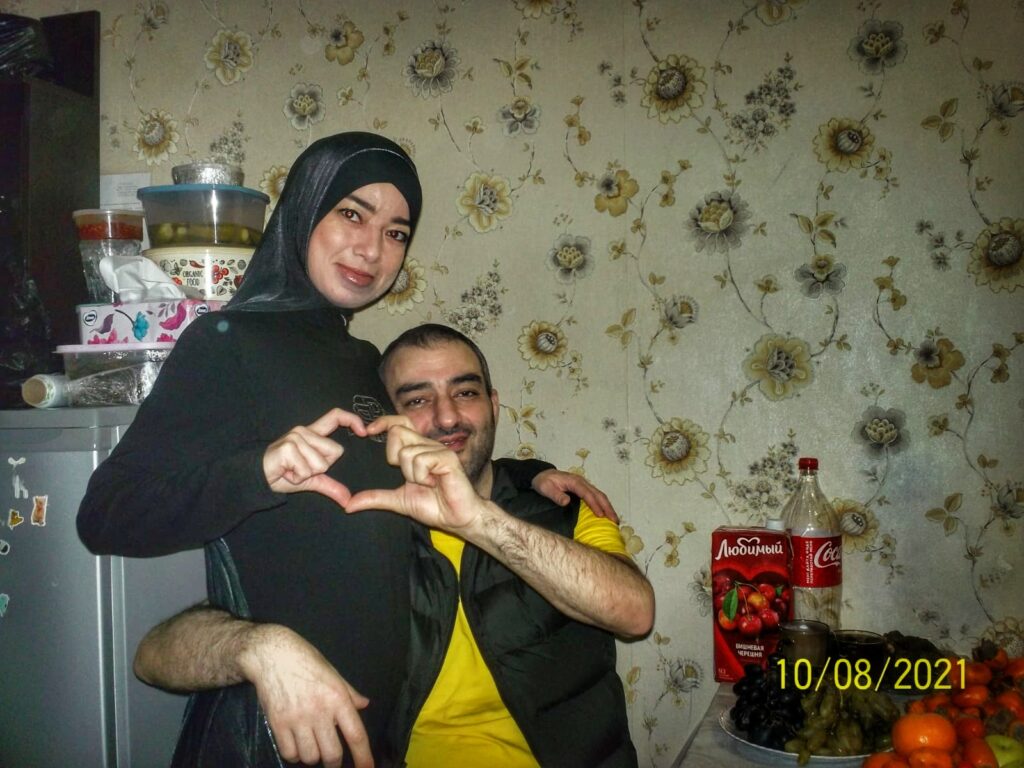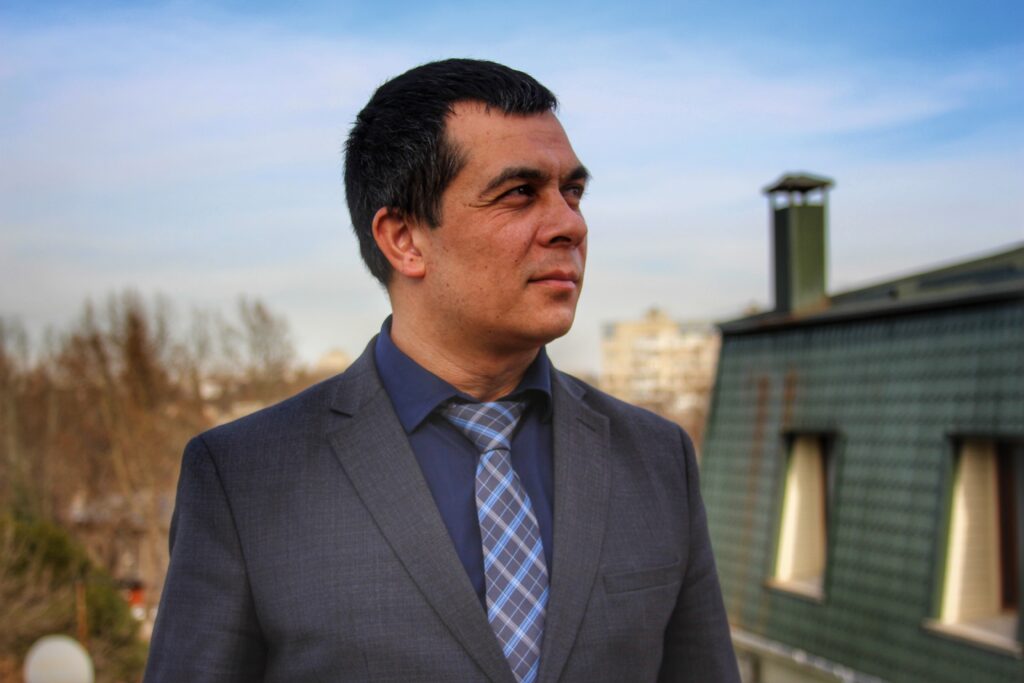
«The convoy brings a person I don't recognise»: what happens to seriously ill Tofik Abdulgaziyev in captivity
 Photo: "Crimean Solidarity
Photo: "Crimean SolidarityDuring the mass searches conducted by the Russian FSB in the occupied Crimea in March 2019 25 people were detained over two days. Among them was Tofik Abdulgaziyev. This incident is referred to as the second Simferopol ‘Hizb ut-Tahrir case’.
Tofik Abdulgaziyev
Russian security forces detained and later arrested Crimean Tatar Tofik Abdulgaziyev. Before his arrest, he assisted families by delivering food to political prisoners in detention centers. He also organized holidays for their children.
The Russians accused him of involvement with the Hizb ut-Tahrir party. It operates freely in Ukraine but is considered a «terrorist» organization in Russia. The Russian ‘panel of judges’ sentenced Abdulgaziyev, as well as all defendants in similar ‘cases.’
Tofik Abdulgaziyev was sentenced by the occupiers to 12 years in a maximum-security colony. The first five years were to be served in prison. His wife, Aliye Kurtametova, recalls that her husband felt unwell in the prison in Verkhnouralsk, Chelyabinsk region, where he was transferred after the sentencing. During a long visit with him in late 2023, Aliye noticed that he had lost a significant amount of weight, and Tofik’s body temperature remained elevated for the entire three days of their visit.
«He told me that after he was brought to the colony, he was placed in a punishment cell for three days. It was September, but this is Chelyabinsk, in the Urals, and it was far from warm when I visited. In the punishment cell, Tofik was without proper clothing, wearing only a thin shirt made of artificial material, almost like glass. He said that the bed in this cell was never lowered during his stay, so he could only sit on a metal ledge. As a result, he spent the nights sleeping on the cold floor tiles. When he told me about this, he said he had never felt so cold in his life,» Aliye recounts her husband’s words.
She added that she constantly provided him with antipyretics and vitamin courses, as she could only address his symptoms without a doctor’s prescription.
«I was sent from building to building; they did not answer my questions…»

For about six months in the colony, Tofik was consistently ill until he was admitted to the intensive care unit with a high fever. Aliye packed her bags and traveled to Chelyabinsk. However, when she called the local prison hospital, the staff refused to provide any information, stating that they could only discuss her husband’s diagnosis and health condition in person:
«While trying to get answers, I started actively writing on Facebook. At the same time, my husband’s lawyer, Emil Kurbedinov, was preparing and sending complaints. When I finally arrived in Chelyabinsk, no one at the prison hospital would speak with me. I was sent from one building to another, and my questions went unanswered. Eventually, when one of the staff members was entering a building, I managed to catch the heavy metal door and followed him inside.»
Once inside, Aliye went to various offices and eventually learned from the staff that this was not a hospital building but a restricted facility. She managed to arrange a meeting with the doctor treating her husband, Olga Angold.
«I started my conversation with the doctor with the words, ‘Did I have to be hysterical for you to see me?’ Because I was really exhausted,» says Aliye.
During the conversation, Aliye discovered that Tofik had been transferred from the intensive care unit to the intensive care ward. It was then that she learned of his diagnosis: disseminated pulmonary tuberculosis, bilateral pneumonia, and several other serious conditions, including small left-sided hydrothorax (fluid in the lungs), third-degree anemia, connective tissue dysplasia syndrome with mitral valve disease (heart disease), chronic heart failure, gastritis, and nephrolithiasis (kidney stones).
«He didn’t recognize us…»
During that trip, Aliye was allowed a brief visit with Tofik within the prison hospital:
«He used to be such a funny guy, always making me laugh during court hearings through the ‘aquarium’ so that I wouldn’t get upset. But then the convoy brought in a man I didn’t recognize. It was an old man who bore no resemblance to Tofik. When he started looking around and squinting, he didn’t recognize us. Later, as we sat down and started talking, he began to understand somewhat. But he didn’t seem to grasp what he was saying. For instance, he would start a conversation about one thing, and a few minutes later, he would be talking about something else entirely, as if he didn’t comprehend the essence of the conversation.»

Tofik Abdulgaziyev’s diagnosis falls under the list of diseases that prevent the detention of suspects and accused persons. His lawyer, Emil Kurbedinov, filed a petition to release him from prison due to his health condition. However, the Metallurgical Court of Chelyabinsk ruled on the seriously ill Abdulgaziyev within 10 minutes, refusing to release him.

In its refusal, the court cited the conclusion of the medical commission of the medical and preventive care facility of the Federal Penitentiary Service of the Russian Federation in the Chelyabinsk region, where Tofik is being treated. The conclusion stated that he «does not require constant care and treatment in a specialized institution and can be held in a penal institution on a general basis.» The conclusions characterized his condition as «stable.» Kurbedinov noted that the stage of tuberculosis indicated in the conclusions did not match the actual stage of Tofik’s disease. The information about the «remission» of his illness was false, and the conclusion itself did not include the names of the doctors who signed the medical report.
«We provided a counter-document stating that the disease exists and is progressing, and that Tofik needs treatment. They stated that medical care could not be provided under the conditions of deteriorating health in the FSIN, and that his disease is included in the list of conditions that preclude serving a sentence,» Kurbedinov told the Crimean Solidarity initiative.
The lawyer added that he intends to appeal. Currently, Tofik Abdulgaziyev remains in the prison tuberculosis hospital No. 3 in Chelyabinsk. His wife says that they sometimes have the opportunity to call each other. Tofik has gained some weight, but his condition remains serious. Doctors predict that he will stay in this hospital for at least six months.
Since the beginning of 2023, two Crimean political prisoners, Dzhemil Gafarov and Konstantin Shiring, have died in detention. This happened due to the failure to provide necessary medical care. Currently, human rights activists are aware of at least 180 Crimean political prisoners. Most of them are Crimean Tatars.
Gafarov-Schiring, as Ukrainian human rights activists refer to it, involves 65 political prisoners with health problems. All of them remain in captivity.
Photo: Oleksandra Efimenko, family archive and Crimean Solidarity


